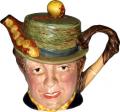Poppy tea is an ancient remedy that has been in use for thousands of years. Poppy tea is mainly used as a pain reliever, cough suppressant or as a sleeping aid, due to its relaxing properties.
An occasional modern use for poppy tea is as part of a detoxification program for opiate or heroin addiction. Poppy tea contains the same qualities as opiate drugs and heroin, but in lower quantities. Poppy tea can be useful for fighting the withdrawal symptoms resulting from such addictions.
Poppy tea generally has a strong, bitter taste. Taken on its own, poppy tea is considered to have a foul taste and can cause nausea. It is normally recommended that poppy tea is drunk as part of a mixture. Some of the more common mixtures used include liquorice. Others may use a pre-prepared, flavored tea.
Properties of poppy tea
Poppy tea is made from opium poppy plants. The most common variety in use is the Papaver Somniferum. This plant contains a number of opiates, including morphine, codeine, papaverine and thebaine.
The plant is commonly sold in the United States and Canada as part of flower arrangement pieces and ornamental displays. Poppy tea is made from dried poppy pods.
Poppy heads can vary in size. They are usually walnut-sized, but can be as large as a golf ball or as small as a glass marble.
Preparation of poppy tea
In order to make poppy tea, the first step is to remove the heads from the stems. Any seeds are removed, and then the poppy pods are crushed, chopped or turned into a fine powder.
The pods are then boiled in a cup of water. One cup of water should be used for every 3-5 pods used, and lower for less pods. Care should be taken not to allow the water to boil completely.
Lastly, the poppy pulp is poured through a strainer. The pulp should be pressed to extract as much juice as possible. The pulp can be reused for a second extraction. When making a second extraction, 2/3 of the water should be used.
It is recommended that between 1-3 pods are used for new drinkers of poppy tea, 2-5 pods for experienced drinkers, and over 5 pods for those using poppy tea to fight opiate or heroin addiction.
The stems can also be used, but poppy tea made from stems contains less potency than the heads.
Warnings on using poppy tea
As poppy tea contains opiates, there is the possibility that a drinker can become physically addicted and habituated to the tea.
If poppy tea is taken for several days in succession, the body may develop a need for the opiates. A drinker may find themselves with an increasing need for poppy tea. If poppy tea is stopped, the re-adjustment may be quite unpleasant.
Some of the side effects include nausea and insomnia.
It is recommended that poppy tea be taken with caution.
